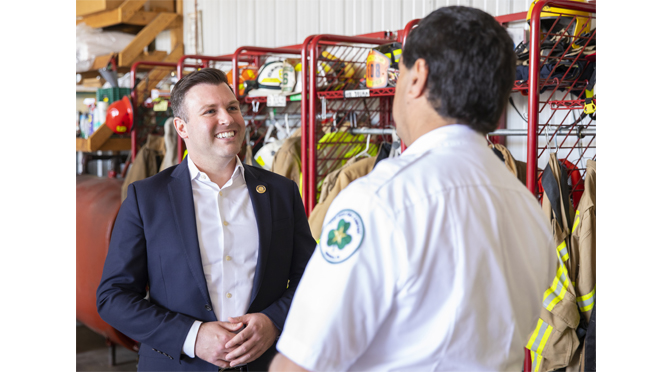|
|
WASHINGTON TOWNSHIP – The challenges faced by emergency first responder organizations in Pennsylvania and possible legislative solutions were the focus of a recent House Republican Policy Committee hearing in Washington Township, Lehigh County, hosted by Rep. Ryan Mackenzie (R-Lehigh) and led by Committee Chairman Joshua D. Kail (R-Beaver). The hearing took place at Emerald Star Hose Fire Company No. 1.
“Our first responders are in a crisis situation in terms of the resources they receive to do the job, the lack of manpower, and the costs associated with providing their services,” Mackenzie said. “We on the state level want to be sure we are doing everything we can to assist you in doing your job to help our communities.”
“Emergency first responders save lives and go above and beyond for our communities,” said Kail. “We must act swiftly to solve the ongoing crisis facing these brave men and women. Thank you to Rep. Mackenzie and our testifiers for their work in shining a bright light on this important discussion.”
Committee members heard testimony regarding the time, money and manpower issues that are currently impacting most fire and ambulance companies in the Commonwealth.
“Departments across the state are seeing decreasing numbers of volunteer firefighters while trying to respond to an increase in service requests from the communities we serve,” said Deputy Chief Brian Carl of the Weisenberg Volunteer Fire Department. “Equipment costs keep rising, and it is becoming increasingly difficult to cover expenses.”
Other speakers testified about the emotional stress emergency first responders experience that can sometimes result in depression and even suicide. According to the Centers for Disease Control and Prevention, more than 120 emergency first responders take their own lives annually.
The General Assembly passed a new law in 2020 (Act 69) to address the issues of emergency first responder mental wellness and stress management through support programs and the creation of a hotline.
“While this statute provides tremendous assistance, it does not add post-traumatic stress disorder or post-traumatic stress injury as a compensable illness under Workers’ Compensation,” testified Don DeReamus, legislative committee chair for the Ambulance Association of Pennsylvania.
The committee also learned that 74% of in-line-of-duty deaths were caused by occupational cancer, according to the International Association of Fire Fighters.
“The reason being the protective equipment that we wear is coated with PFAS (per- and polyfluorinated substances),” explained J. T. Klein, northeast field service representative with the Pennsylvania Professional Fire Fighters Association. “There has been a movement across the country to ban such chemicals in our equipment.”
Other speakers talked about the need to provide incentives to attract more volunteers, including income tax breaks and higher education tuition assistance.
“We need bold moves and suggestions from this committee,” concluded John Price, Emmaus Fire Department director of emergency services. “It’s time for Pennsylvania to do something about this fractured system.”
Also providing testimony at the hearing were Tito Burgos, Emerald Star Hose Fire Company No. 1 chief; Howard Schwartz, Northern Valley EMS board member and paramedic; David Nelson, Whitehall Fire Department chief; Jim Stewart, Neffs Volunteer Fire Company chief; Dennis Wetherhold, Slatedale Fire Department captain; and Bob Elbich, Lehigh County commissioner.







